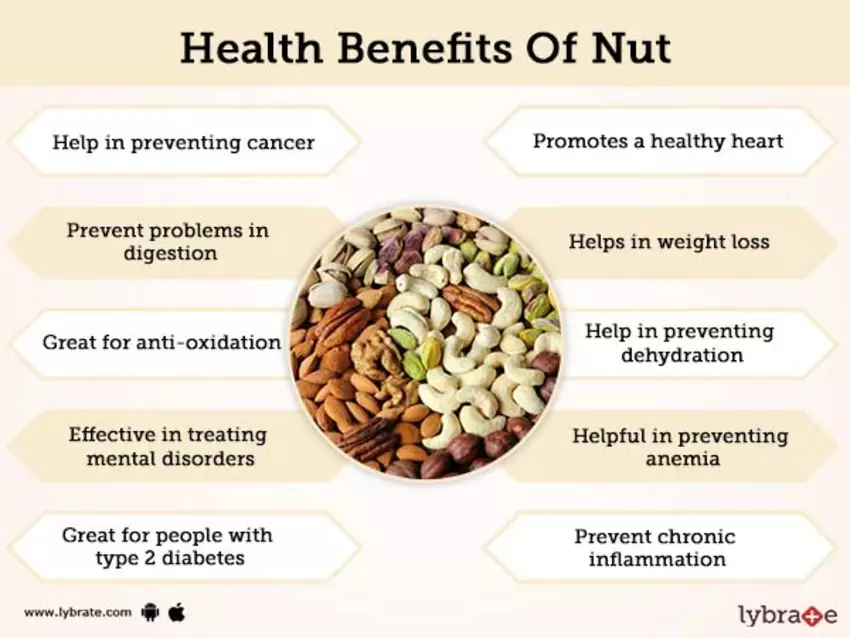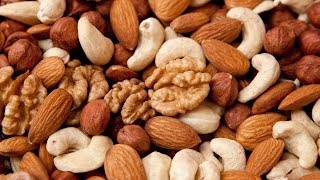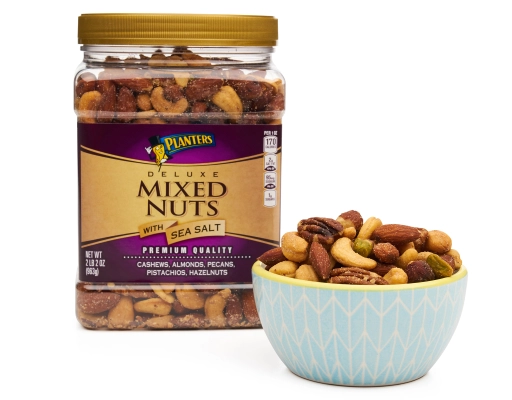Nuts are generally regarded as a casual snack. However, nuts yield a host of nutritional benefits for our bodies. So much so that they can easily be included as a daily part of our diets. This article contains the facts about nuts, including their nutritional values.
What are Nuts?
What are nuts exactly? Are they vegetables, fruits, meats, a starch? Nuts are actually fruits. They are fruits made up of a hard shell that protects a kernel. The kernel is what we eat. While there are seeds referred to as nuts, but in plant classification, “nut” denotes that the shell does not release the seed but remains closed. Fortunately, nuts can be purchased already shelled and ready to eat.
Some of the most commonly consumed nuts are:
- Walnuts
- Pistachios
- Macadamia nuts
- Almonds
- Brazil nuts
- Hazelnuts
- Pecans
- Pine nuts
- Cashews
The Benefits of Nuts
Although nuts contain a high amount of fat, they have numerous significant health and weight benefits.
Nuts are:
A Great Source of Many Nutrients – Nuts are exceedingly nutritious. One (1) ounce (28 grams) of mixed nuts contains:
- Calories: 173
- Carbs: 6 grams
- Copper: 23% of the RDI
- Fat: 16 grams, including 9 grams of monounsaturated fat
- Fiber: 3 grams
- Magnesium: 16% of the RDI
- Manganese: 26% of the RDI
- Phosphorus: 13% of the RDI
- Protein: 5 grams
- Selenium: 56% of the RDI
- Vitamin E: 12% of the RDI
Various nuts are higher in specific nutrients than others are. For example, one Brazil nut yields more than 100% of the Reference Daily Intake (RDI) for selenium.
The carbohydrate matter of nuts is highly irregular. Hazelnuts, macadamia nuts, and Brazil nuts have fewer than 2 grams of digestible carbs per serving, while cashews have almost eight (8) digestible carbs per serving. For this reason, nuts are, in general, great food to eat on a low-carb diet.
Ladened with Antioxidants – Antioxidants, which include the polyphenols in nuts, are able to combat oxidative stress by counteracting free radicals. Free radicals are unstable molecules that can cause cell damage and escalate disease risk (reference).
A research study established that walnuts have a bigger capacity to battle free radicals than fish (reference).
Research also indicates that the antioxidants in walnuts and almonds can guard cells’ delicate fats against being damaged by oxidation (reference, reference, reference, reference).
In a study involving thirteen individuals, consuming walnuts or almonds elevated polyphenol levels and lessened oxidative damage considerably in contrast to a monitored meal (reference).
Another study found that 2–8 hours after ingesting whole pecans, individuals experienced a 26–33% drop in their levels of oxidized “bad” LDL cholesterol, a significant risk factor for heart disease.
However, research involving the elderly and adults with metabolic syndrome discovered that walnuts and cashews did not significantly impact antioxidant capacity, although some other markers improved.

Can Aid with Weight Loss – Ironically, although nuts are considered a high-calorie food, studies suggest that nuts can help with weight loss.
One study reviewing the results of the Mediterranean diet discovered that individuals delegated to ingest nuts decreased approximately two inches (5 cm) from their waists. This result was considerably more than individuals who were given olive oil.
In controlled studies, almonds have been steadily shown to advance weight loss rather than weight gain. Some studies suggest that pistachios aid weight loss also. (reference, reference).
In one study in overweight women, those eating almonds lost nearly three times as much weight and experienced a significantly more significant waist size decrease than the control group (reference).
Additionally, although nuts are relatively high in calories, studies indicate that the body does not take in all of them since a portion of fat remains trapped within the nut’s fibrous wall for the duration of digestion (reference).
For example, although the nutritional information on a packet of almonds could show that a 1-ounce (28-gram) serving has 160–170 calories, the body takes in only about 129 of these calories.
In the same way, more recent studies have discovered that the body takes in about 21% and 5% less calories from walnuts and pistachios, in that order, than previously reported (reference, reference).
Effective for Type 2 Diabetes and Metabolic Syndrome – Type 2 diabetes
is a widespread disease that affects hundreds of millions of individuals worldwide.
Metabolic syndrome refers to a group of risk factors that can increase the risk of heart disease, stroke, and type 2 diabetes. Hence, type 2 diabetes and metabolic syndrome are connected. For more on metabolic syndrome, see The Facts about Metabolic Syndrome on this website.
It is interesting to note nuts can be among the best foods for metabolic syndrome and type 2 diabetes individuals. They are low in carbohydrates and do not increase blood sugar levels by a significant amount. Therefore, ingesting nuts instead of higher-carb foods should reduce blood sugar levels.
Research suggests that ingesting nuts can also decrease blood pressure, oxidative stress, and other health markers in individuals with diabetes and metabolic syndrome (reference, reference, reference, reference).
In a controlled 12- week study, individuals with metabolic syndrome who consumed just less than 1 ounce (25 grams) of pistachios twice per day encountered a 9% reduction in fasting blood sugar, on average (reference).
Also, when compared to the control group, the pistachio group had more significant reductions in blood pressure and C-reactive protein (CRP), which is a marker of inflammation linked to heart disease.
However, the evidence is mixed, and not all studies observe an advantage from consuming nuts in individuals with metabolic syndrome (reference).
Can Reduce Inflammation – Nuts have potent anti-inflammatory resources.
Inflammation is the body’s way of shielding itself from bacteria, injury, and other possible damaging pathogens.
However, chronic, long-term inflammation can cause organ injury and advance disease risk. The research proposes that consuming nuts reduces inflammation and supports healthy aging (reference). For more on inflammation, please see the article, The Dangers of Inflammation, on this website.
According to a study on the Mediterranean diet, individuals whose diets were supplemented with nuts encountered a 35% and 90% reduction in the inflammatory markers C-reactive protein (CRP) and interleukin 6 (IL-6), respectively (reference).
In the same way, a few nuts, including pistachios, almonds, walnuts, and Brazil nuts, have been established to battle inflammation in healthy individuals and those with severe conditions such as kidney disease and diabetes (reference, reference, reference, reference, reference).
However, one study on almond intake in healthy adult individuals noticed little difference between the almond and control groups, though a few inflammatory markers lessened in those that ingested almonds (reference).
Contain high amounts of Fiber

Fiber yields numerous health advantages.
Although the body cannot digest fiber, the bacteria that live in the colon can. Various kinds of fiber operate as prebiotics or food for healthy gut bacteria.
These gut bacteria then ferment the fiber and turn it into beneficial short-chain fatty acids (SCFAs). These SCFAs have potent benefits that include improving gut health and reducing the risk of diabetes and obesity (reference, reference).
Additionally, fiber helps an individual feel full and reduces the number of calories absorbed from meals. A study found that boosting fiber ingestion from 18 to 36 grams a day can lead to up to 130 fewer calories absorbed (reference, reference).
Below are nuts with the highest fiber content per 1-ounce (28-gram) serving:
- Pistachios: 2.9 grams
- Pecans: 2.9 grams
- Peanuts: 2.6 grams
- Macadamias: 2.4 grams
- Hazelnuts: 2.9 grams
- Brazil nuts: 2.1 grams
- Almonds: 3.5 grams
Can Reduce the Risk of Heart Attack and Stroke – Nuts are extremely good for the heart. A number of studies propose that nuts assist in lowering heart disease and stroke risk attributable to their benefits for artery function, bad LDL particle size, cholesterol levels, and inflammation ( reference, reference, reference, reference).
Studies have found that small, dense LDL particles can elevate heart disease risk further than larger LDL particles (reference, reference).
A study on the Mediterranean diet discovered individuals who consumed nuts had a significant decline in small LDL particles and an increase in large LDL particles and “good” HDL cholesterol levels.
In an additional study, individuals with normal or high cholesterol were arbitrarily allocated to ingest either olive oil or nuts with a high-fat meal. Individuals who were in the group that consumed nuts had improved artery function and lowered fasting triglycerides than the group that consumed olive oil, not considering their original cholesterol levels (reference).
Where to buy nuts
Nuts are delicious and widely available. They can be consumed whole, creamed (e.g., peanut butter), or chopped and used for toppings.
They can be purchased in grocery stores, and online [paid link]and come in various options, including raw, roasted, unsalted, salted, seasoned, or plain.
__________________________________________
On the whole, it is more healthy to consume nuts raw or toast them in the oven below 350°F (175°C). Dry-roasted is the next-best option. However, it is best to avoid nuts that are roasted in vegetable and seed oils.
Nuts can be stored at room temperature or placed in the refrigerator or freezer to keep them fresh longer.
Comments, questions, and concerns may be left below.
Good Health!!


What a fascinating article about the benefits of nuts in a balanced diet. I’ve known about the fiber and anti-inflammatory properties for a long time but hesitated to add them because of the calories. I appreciate you making it clear that eaten in small quantities there are more benefits and can even help you to lose weight.
Thanks for this interesting article.
Hi Lily – Yes, nuts are very beneficial for our health in small quantities. It’s the excesses that get us into trouble! I am happy that you found the article to be informative.
Thanks for commenting!
I absolutely love nuts! Nuts are a good source of protein. My personal favorite is almonds. I believe that they are the highest when it comes to protein intake. They are also a great snack to have around the house. I usually have my nuts as a snack with raisins. Is this the correct way to consume your nuts?
Yes nuts are ok with raisins. They’re good with dark chocolate too! As long as it’s not in excess. Raisins are high in sugar.